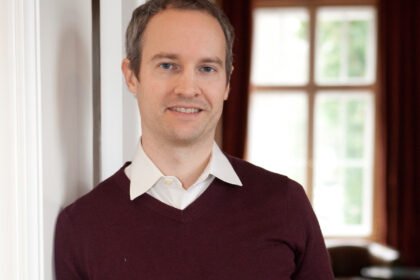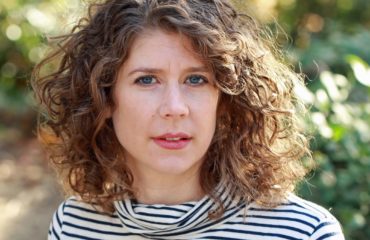INTERVIEW WITH Robyn Creswell

Forthcoming from Farrar, Straus and Giroux this fall is the long-awaited collection of poetry by Iman Mersal, translated by Robyn Creswell, titled The Threshold. The author of five books of poems, Mersal is a highly acclaimed Egyptian poet and writer, currently based in Canada, where she teaches Arabic language and literature at the University of Alberta. Her collaboration with Robyn Creswell began when he became poetry editor of The Paris Review in 2010, with an enthusiasm for publishing more Arab poets. In addition to The Paris Review, Creswell’s translations of Mersal’s poems have appeared in The New York Review of Books, The Arkansas International, The Virginia Quarterly Review, and elsewhere. To accompany three featured poems by Iman Mersal this September, Four Way Review poetry editor Sara Elkamel spoke with translator Robyn Creswell about The Threshold.

SARA ELKAMEL: Congratulations on your forthcoming collection of Iman Mersal’s poetry in translation, The Threshold (Farrar, Straus and Giroux, 2022)! It gathers poems from four of Iman’s collections: A dark alley suitable for dance lessons (1995), Walking as long as possible (1997), Alternative geography (2006), and Until I give up the idea of home (2013). Can you tell us a little bit about the process you went through, together with Iman, to get this collection together? How did you go about selecting the poems?
ROBYN CRESWELL: Iman is a poet of sensibility: she has an immediate, idiosyncratic presence on the page. Her voice—really a congeries of voices—is unforgettable once it gets in your ear. But it’s also a sensibility that develops in large part by looking back on prior performances: reading Iman’s work in chronological order, you have this feeling of astonishing self-sufficiency—her voice expands, matures, and addresses itself to different topics, but the transformations result from self-reflection.
When we chose the poems of The Threshold—and we discussed the table of contents endlessly, because it was fun to arrange and rearrange the poems—I think we wanted to make sure the distinctiveness of Iman’s voice came through, but also its dramatic evolution. So the poems are arranged roughly in the order they were first published, although we also made sure that short and long poems alternate, and the variety of voices is on full display.
SE: You’ve been working with Iman for several years now (I remember reading your gorgeous translation of “The Idea of Houses” in The Nation in 2015). Can you tell us how you first started translating her poetry, and how your evolving collaboration has in turn manifested in the translations?
RC: When I became poetry editor of The Paris Review in 2010, one of my aims was to publish a larger chorus of Arab poets in the magazine. At the time, I think the only poet writing in Arabic who had been published in the Review was Mahmoud Darwish. An Egyptian friend of mine, Waiel Ashry, suggested that I read Iman. At the time, I had what I now recognize as a schoolboyish appreciation of modern Arabic poetry: I mostly read the classics (Darwish, Adonis, Nizar Qabbani, Badr Shakir al-Sayyab), and was suitably awed. Reading Iman was like encountering a contemporary: here was someone who was, I felt, writing the present (to borrow a phrase of Elias Khoury).
I wrote to Iman asking if she might be willing to share some current work with me and among the poems she sent was “A Celebration.” I love that poem—the way it begins with a figure of speech, then literalizes it (“The thread of the story fell to the ground, so I went down on my hands and knees to hunt for it”). Then the juxtaposed scenes of an encounter on a train with an Afghan woman and a patriotic rally in Cairo. The relation between the two episodes, one intimate, the other collective, is never spelled out—it has something to do with the experience of speaking words in a “foreign” language—but the idea of putting them together is what makes the poem characteristic of Iman.
After that first poem we began working on others, until the idea of a book became more or less inescapable. Working with Iman—we’ve worked very closely—has been a pleasure and a privilege. She has a knack for seeing where my English versions aren’t quite right (I’m abashed now to look at some of my first drafts), but she never imposed her own solutions. I’ve learned more from her about Arabic poetry—how it works, its range of tones, its levels of diction—than any other teacher. I’ve been very lucky.
SE: You’ve previously referred to Iman Mersal’s voice as having a “sinuous, rough-edged music” that can be challenging to translate. I also find that irony and wry humor permeate Iman’s poems, which I imagine would be difficult to always carry across into English. Do you remember any particular challenges with translating any of the three poems featured in FWR?
RC: English can do wryness, but Arabic verse has musical possibilities that I don’t think contemporary poetry in English can really capture. Because written Arabic is a literary language—it isn’t spoken except in formal situations—it’s possible to be grandly symphonic or virtuosically lyrical in a way that’s hard to imagine in English. You’d have to be a Tennyson to match the musical effects in Darwish’s late poetry, for example. But of course trying to be Tennysonian would be fatal.
With Iman the difficulty for an English translator is different, and I would say more manageable. In a poem about her father, she wonders whether he might have disliked her “unmusical poems.” I don’t think they’re actually unmusical (I don’t think Iman does either), but their rhythms and cadences and sounds have a lot in common with the spoken language. She writes in fusha, sometimes called “standard” Arabic, but her style shares many features of the vernacular: she doesn’t use ten-dollar words, her syntax is typically straightforward, economy is a virtue. She also uses tonal effects—sarcasm, for example—that we tend to associate with speech.
We talked a lot about “A grave I’m about to dig.” I’m still not sure Iman likes my choice of “diagonal” for the Arabic ma’ilan, to describe the way a bird falling out of the sky might appear to an observer on the ground (but that’s how I think of Iman: she sees things at a slant). The last phrase of the poem, “were it not for the sneakers on my feet” is a typical moment of self-deprecation, a comedy of casualness. There are no feet in the Arabic original, however, which just says “were it not for my sneakers” (or, more literally, “my sports shoes”). I thought adding the phrase “on my feet” was needed, both for musical reasons and because it suggests a pun that isn’t available in Arabic, where verse meters aren’t called feet. For me, Iman’s (musical, metrical) feet really do wear sneakers: they’re quick and agile, casual but spiffy. They’re what we wear today.
SE: Iman’s poems typically take on different forms as well as registers–at times indulging in the lyric, and at times sacrificing it for the sake of a more restrained, almost academic language. She recently told me that she believes poems don’t have “forms” as much as “personalities.” Do you find you have to “get to know” a poem of hers before you approach a translation? If so, what does that process look like?
RC: I think translation is the process—or a process—of getting to know a poem. My first versions tend to be awkward, formal, overly reliant on obvious equivalents (something like the French faux amis). That isn’t so different from the way one talks with a new acquaintance: conventions can be useful. It’s only later, and gradually, that you begin to see what makes the poem—if it’s a good poem—worth spending time with.
SE: Finally, can you tell us a little bit about the choice of title for your forthcoming collection, The Threshold?
RC: “The threshold,” in Arabic al-‘ataba, is an important motif in several of Iman’s poems. It names a site of risk, guilt, transformation. It’s also the title of a long poem that comes at the midpoint of the collection. To my mind, this is Iman’s farewell to the era of her youth. It’s a valedictory poem about Cairo in the nineties, full of Europeanizing elites, posturing poets, and entitled State intellectuals. It’s a poem of the open road that also tells the story of a generation: Iman and her friends wend their way from the Opera House in Zamalek, Cairo’s poshest neighborhood, to the ministry buildings and bars of downtown, through the streets of Old Cairo, and out into the City of the Dead—a burial ground that’s also a point of departure.
–
Robyn Creswell teaches Comparative Literature at Yale University and is a consulting editor for poetry at Farrar, Straus and Giroux. He is the author of City of Beginnings: Poetic Modernism in Beirut, and a regular contributor to The New York Review of Books.


